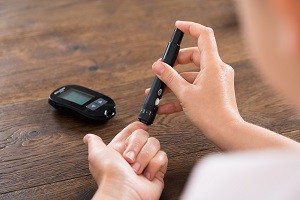Written by Angeline A. De Leon, Staff Writer. Over the course of 12 weeks, Panax ginseng berry extract significantly enhanced the fasting and postprandial glucose levels of individuals with fasting glucose levels of 110 g/dL or higher.
 As the global rate of diabetes rises steadily 1, a growing body of research highlights the antihyperglycemic properties of ginseng as a promising intervention tool 2-4. The major active components of ginseng show a regulatory effect on glucose levels, with new studies suggesting that the berry of the plant, rather than the more conventionally used root, may possess the most potent antihyperglycemic effects 5.
As the global rate of diabetes rises steadily 1, a growing body of research highlights the antihyperglycemic properties of ginseng as a promising intervention tool 2-4. The major active components of ginseng show a regulatory effect on glucose levels, with new studies suggesting that the berry of the plant, rather than the more conventionally used root, may possess the most potent antihyperglycemic effects 5.
In South Korea, a study by Choi and colleagues (2017) employed the first trial to assess the efficacy and safety of ginseng berry extract on glycemic control in humans. 72 participants (aged 20-75) with fasting glucose levels between 100 mg/dL and 140 mg/dL were enrolled in a 12-week randomized, double-blind, and placebo-controlled clinical trial. Data was collected from a total of 63 individuals who completed the study, with participants randomly assigned to receive either ginseng berry extract (n = 34) or a placebo (n = 29). Those in the ginseng group consumed four capsules daily, each containing 250 mg of standardized Panax ginseng berry extract for a total treatment dose of 1 g/d. At the beginning and end of intervention, an oral glucose tolerance test (OGTT) was performed to measure changes in glucose concentration and lipid profile (e.g., insulin, triglyceride, total cholesterol levels) from the time of fasting to the postprandial period (time after meal).
In the total study population, no significant effects of ginseng berry extract were evident based on measures of glucose and insulin at Week 0 and Week 12. However, in participants with a fasting glucose level of 110 mg/dL or higher, ginseng berry extract significantly reduced fasting glucose levels by 3.7% (p = 0.035) (120.25 +/- 10.32 mg/dL vs. 115.81 +/- 9.30 mg/dL) and postprandial glucose levels at the 60-minute mark of the oral glucose tolerance test by 10.7% (p = 0.006) (231.75 +/- 37.58 mg/dL vs. 206.94 +/- 40.28 mg/dL) post-intervention. In comparison, the placebo group showed no such statistically meaningful decreases in glucose concentration.
Results of the exploratory analysis by Choi and colleagues (2017) validate the beneficial role of ginseng in glucose metabolism 4, suggesting that ginseng berry extract may be particularly helpful to individuals with generally higher glucose levels. Long-term consumption of ginseng berry extract was shown to be safe and effective in humans, especially those with fasting glucose levels of 110 mg/dL and higher.
Overall evidence supports Panax ginseng berry’s promise as a natural approach to healthy management of glucose metabolism 5. Due to the fact that participants in the present study were predominantly prediabetic, however, results should be interpreted carefully when generalizing to individuals with an actual diagnosis of diabetes. It remains for future research studies to explore the exact mechanisms underlying the ginseng herb’s powerful pharmacological effects.
Source: Choi HS, Kim S, Kim MJ, et al. Efficacy and safety of Panax ginseng berry extract on glycemic control: A 12-wk randomized, double-blind, and placebo-controlled clinical trial. Journal of Ginseng Research. 2017; 0(0):1-8; DOI: http://dx.doi.org/10.1016/j.jgr.2017.01.003
Click here to read the full text study.
Posted March 20, 2017.
Angeline A. De Leon, MA, graduated from the University of Illinois at Urbana-Champaign in 2010, completing a bachelor’s degree in psychology, with a concentration in neuroscience. She received her master’s degree from The Ohio State University in 2013, where she studied clinical neuroscience within an integrative health program.
References:
- Shaw JE, Sicree RA, Zimmet PZ. Global estimates of the prevalence of diabetes for 2010 and 2030. Diabetes research and clinical practice. 2010;87(1):4-14.
- Sotaniemi EA, Haapakoski E, Rautio A. Ginseng Therapy in Non-Insulin-Dependent Diabetic Patients: Effects on psychophysical performance, glucose homeostasis, serum lipids, serum aminoterminalpropeptide concentration, and body weight. Diabetes care. 1995;18(10):1373-1375.
- Vuksan V, Sievenpiper JL, Koo VY, et al. American ginseng (Panax quinquefolius L) reduces postprandial glycemia in nondiabetic subjects and subjects with type 2 diabetes mellitus. Archives of internal medicine. 2000;160(7):1009-1013.
- Vuksan V, Sung M-K, Sievenpiper JL, et al. Korean red ginseng (Panax ginseng) improves glucose and insulin regulation in well-controlled, type 2 diabetes: results of a randomized, double-blind, placebo-controlled study of efficacy and safety. Nutrition, Metabolism and Cardiovascular Diseases. 2008;18(1):46-56.
- Dey L, Xie J, Wang A, Wu J, Maleckar S, Yuan C-S. Anti-hyperglycemic effects of ginseng: comparison between root and berry. Phytomedicine. 2003;10(6-7):600-605.
